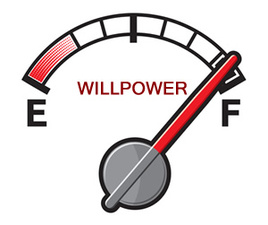 A series of good habits is pretty much all it takes to foster a culture of success in all areas of your life. To form a set of good habits all you need to do is adopt a couple of good habits at a time through repeated action. Don’t commit to adopting too many habits all in one go.That is more than the average person’s will power can handle. However, once a good habit is formed it gets easier and easier to build on that base to form more good habits. Now, a lot of literature out there talks about how will power is limited, however, what you don’t often hear being discussed is that “the will power muscle” can be grown. The more you exercise your will power the more will power you gain. In this article I aim to help you understand will power a little better so that you can use it to your advantage.My writing on will power is informed by several books that I have read including The One Thing by Gary Keller and Jay Papasan as well as The Power of Habit by Charles Duhigg. Will Power Is Limited – What Does That Mean? When you wake up in the morning you have a full tank of will power. Over the course of the day, every time you encounter a situationthat requires you to exercise control, that will power is used up. This means every time you encounter a situation you have less and less will power to deal with that situation. Once you form certain habits or standard responses, those challenging circumstances cease to tax your will power. I’ll give you some examples that are very common in every day life.  Examples of Instances Where Exercise Will Power Is Used Up Food You wake up in the morning and face the first challenge:Crunchy Nut Cornflakes or Oats If you don’t particularly like oats but choose to eat them anyway because they are good for you then that decision uses up a bit of your limited will power for that day. If you set a given standard that you’ll eat oats for breakfast everyday except Saturday you cease to use up any will power at breakfast because the decision of what to eat has been decided beforehand;you’ll eat oats at breakfast out of habit and you might even start to like them. Challenge 2: Around 10 a.m. you feel hungry. If someone offers you a biscuit or slice of cake you will take it. If you’ve developed the habit of always carrying fruit with you to snack on when mid-morning hunger hits then you’re equipped not to give in to sugary treats. Carrying fruit around with you is a good standard habit. Temper Every time you get annoyed or upset but manage to handle a situation without letting emotions get the better of you, you use up some will power. In The Power of Habit by Charles Duhigg he recounts a very interesting experiment. Two groups were invited to take part in a study:
 After that, each group was asked to do a boring task. A series of numbers popped up on a computer and every time a 6 was followed by a 4 the participants were told to press a certain button. Interestingly, group 1 did well and managed to continue doing this rather mundane task for the entire 12 minutes whilst group 2 kept making errors and for the most part couldn’t do the experiment for the full 12 minutes. The conclusion was group 2 had used up their will power in the first part of the experiment. However, because group 1 were made to feel like they were helping and were an integral part of the initial phase of the experiment their will power wasn’t used up by the time they were set in front of the computer. To the extent that we feel in control of a situation(as group 1 were made to feel) we don’t use up will power. Money Most people purchase whatever they want to buy if they have the money (or credit) and every time they stop themself from purchasing something their heart desiresthey use up some will power. If you adopt the standardthat you only go shopping for, say makeup and clothes, on a Sunday then every other time you see something nice in a street window you don’t purchase it on impulse because it’s not Sunday. By the time Sunday arrives you might decide you don’t want whatever it is that looked amazing in the week. In conclusion, any situation that requires you to exercise self-control uses up your limited will power. If you set up some rules for dealing with these situations then you don’t have to think up a reaction every time; this will result in less usage of your will power. The better you get at managing your will power using a bank of good habits and pre-set standard responses, the less of it you will use up unnecessarily To your success.  Want to Build a 6-Figure Beauty Business from the comfort of your sofa? Then my course is designed for YOU! "Beauty" includes a WIDE range of products from the not so obvious non-perishable foods and crafts to the more obvious hair, makeup, fashion, health & fitness.
1 Comment
 When it comes to education more is always better, right? Wrong. It’s not always the case. Over the last year I have met a couple of people who like investing in coaching and entrepreneurship programmes but they simply do way too many of them. Coaching and training definitely helps with the acquisition of knowledge but that knowledge is totally useless if you don’t do anything with it. One person I met had spent about £20,000 ($30,000) on various programmes within one year but hadn’t put anything into action. I thought that was a big waste of time and money. I kept trying to emphasize to her that she needs to start implementing what she’s learnt because that is the only way she would see results. I hope I got through to her but I dare say even when we were talking she seemed to be considering what programme she would do next. INFORMATION OVERWHELM The problem with taking part in too many programs is that you receive so much information that you have no idea where to start with implementing it. It overwhelms and confuses you. You’ll end up writing lists and lists of what you need to work on but ultimately if you have too much information, you do nothing. You just move on to the next course with the hope that it helps to bring clarity to your confusion.  LAGS BETWEEN LEARNING AND DOING If you leave a long gap between learning something and incorporating it into your business then you forget about it. You never get round to implementing it. If you’ve paid for a simple program then this is not an issue but the more expensive programmes usually pack in a lot of homework and you have to do all of it to get the maximum benefit. Don’t wait a long time to start working with something that you’ve learnt. If you can’t implement it, find someone who has the time and capacity to do it for you. THE RIGHT WAY TO INVEST IN TRAINING: REVISE WORK ALREADY DONE There are a variety of “right” ways to get the most from training. If you’ve paid to learn something then you have to implement it otherwise you’re just pouring money down the drain. If you’ve invested in a quality programme, implement what you’re learning as you go along. Then, before moving on to a new programme, go over the material one more time to make sure you’ve got everything before investing in something new.  The first time you go through training you will inevitably only implement the easiest or base-level concepts into your business. The second time you go through the material, there will be more you can implement or that you didn’t consider the first time round. Sometimes success or a boost in earnings isn’t the result of making a huge sweeping change, the correct, small tweak can lead to massive returns. Yes, as someone who has a program on How To Build A 6-Figure Product Business I should be saying so loads of coaching, pack in as much knowledge as possible but I’d be lying if I did that. Implementation of existing knowledge can be more important that acquiring now knowledge…  Want to Build a 6-Figure Beauty Business from the comfort of your sofa? Then my course is designed for YOU! "Beauty" includes a WIDE range of products from the not so obvious non-perishable foods and crafts to the more obvious hair, makeup, fashion, health & fitness.  I listened to a lot of Grant Cardone in 2014. In Sell or Be Sold he has this one little section where he talks about how he works 14 hours a day on his best days and does more in 2.5 days than most people do the whole week. Grant then goes on to say that come Sunday, having done nothing all week some people still feel entitled to rest because “The Good Book” says they should rest. As far as Grant is concerned and I would tend to agree that logic is completely flawed. He thinks God rested on the 7th day because he’d built the whole entire world in 6 days and as such deserved a rest. You haven’t done anything solid all week and still you think you need a rest? What? Why? Indeed, every religion has it’s own day of rest whether it be Friday, Saturday or Sunday and a lot of people use it as a justification for not working. If you’ve been as productive as you want to be the rest of the week, why not? However, the fact is most haven’t. I personally think rest has to be well earned and if you’re going to make it in this life there will be months when you cannot take a single day fully off. Even when I was pregnant and exhausted I was working like a donkey most days until the 37th week when I cut back to about 2 to 4 hours per day. As a student in both high school and university I used to go to chapel every Sunday but that didn’t mean I didn’t do any work. I just did my work around chapel and ensured that I didn’t laze around the rest of the week. Chapel was actually one of my favourite times of the week because it was a very social experience. I was friends with many people at chapel and usually spent an hour afterwards hanging out. After I was done enjoying myself I went back to hit the books. If you feel like you’re underachieving relative to where you should be and you also take a day off every week for religious reasons I would have a critical think about that. I’m not going to tell you what you should do all I will say is that you are the mistress of your own fate and small things like allowing yourself to work on the day you have been taught to believe is “a day of rest” can make a massive difference in your output. God doesn’t care when you work. If God was so against me working on Sundays then why did he let me go from academic success to academic success? From a struggling 11 year-old how is it that by the time I was 17 He gave me all the resources to get into Cambridge and then ultimately to graduate with a first class degree? Ultimately, you could be saying I am not working on Sunday or Saturday or Friday for religious reasons when the truth is, you’re not working on that day because you don’t want to and feel a religious reason is a good justification for your laziness. ‘Nuff said.  Want to Build a 6-Figure Beauty Business from the comfort of your sofa? Then my course is designed for YOU! "Beauty" includes a WIDE range of products from the not so obvious non-perishable foods and crafts to the more obvious hair, makeup, fashion, health & fitness. |
Heather on WealthI enjoy helping people think through their personal finances and blog about that here. Join my personal finance community at The Money Spot™. Categories
All
Archives
September 2023
|
Heather Katsonga-Woodward, a massive personal finance fanatic.
** All views expressed are my own and not those of any employer, past or present. ** Please get professional advice before re-arranging your personal finances.
 RSS Feed
RSS Feed


